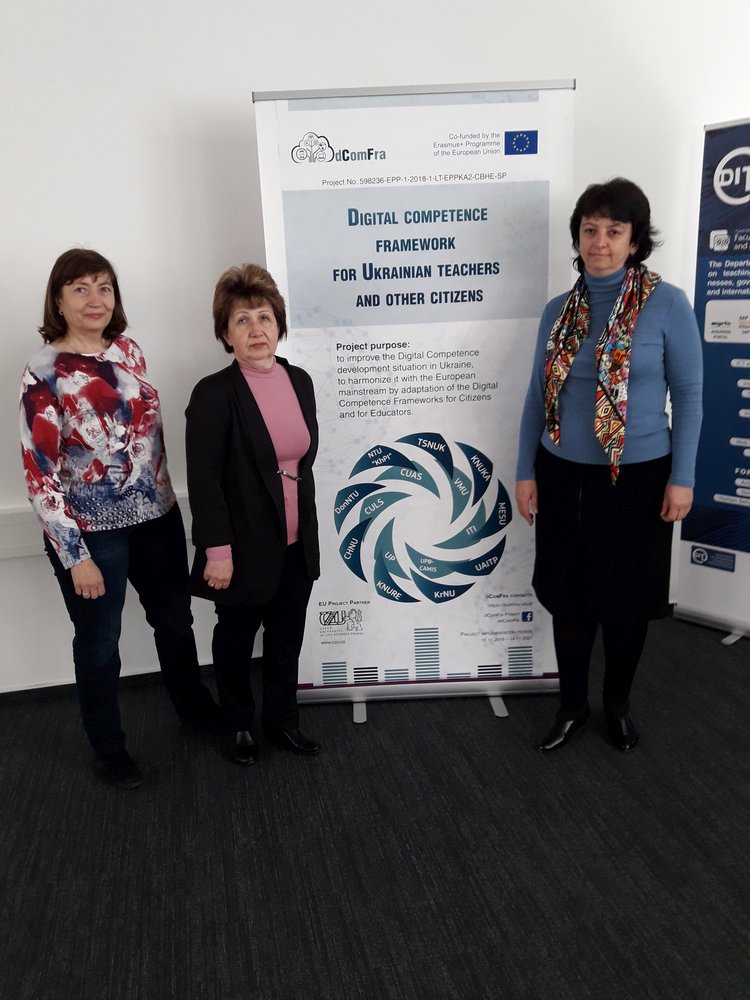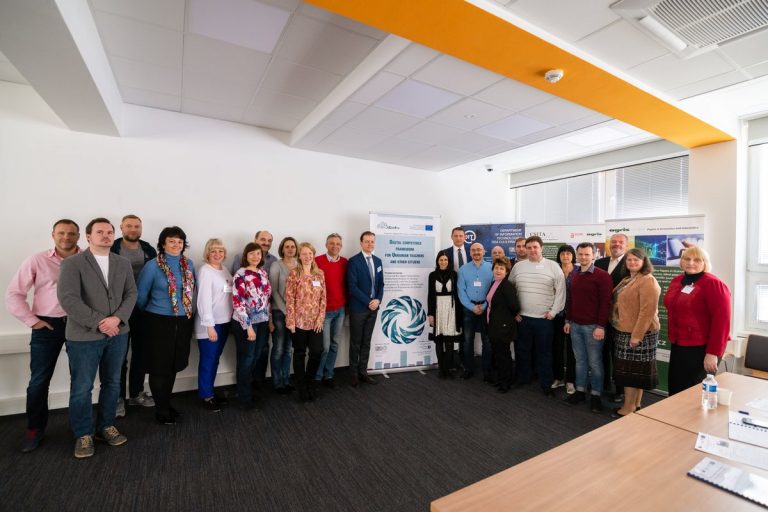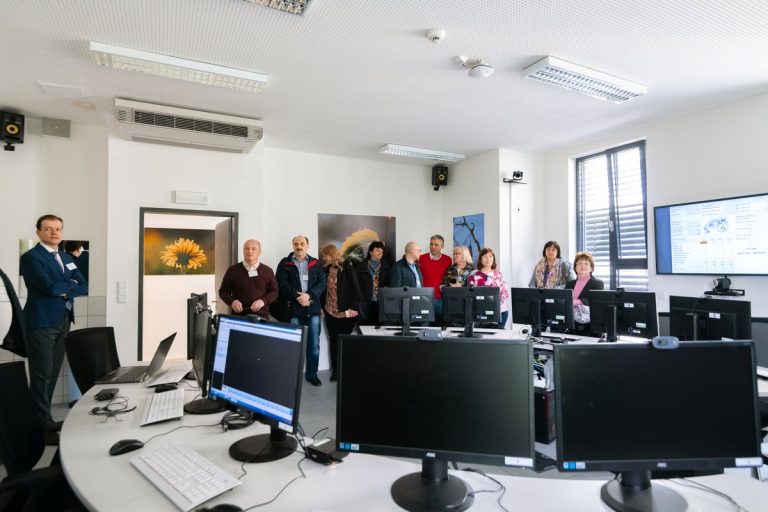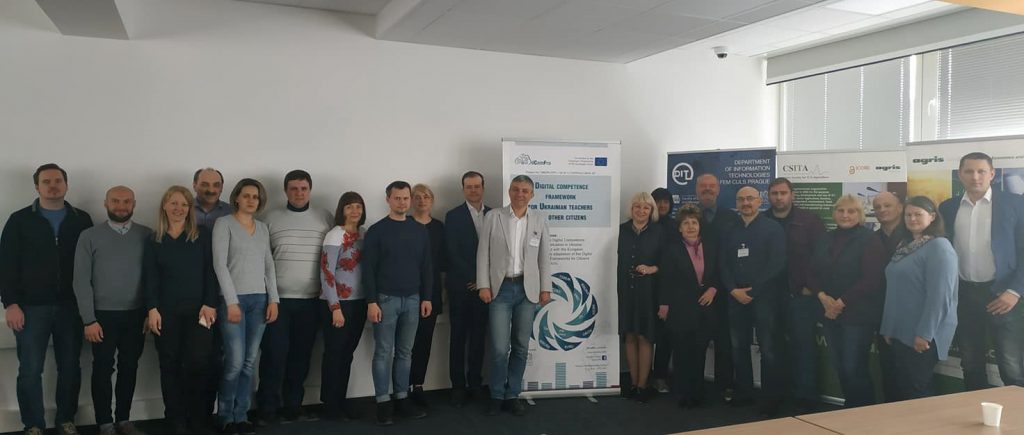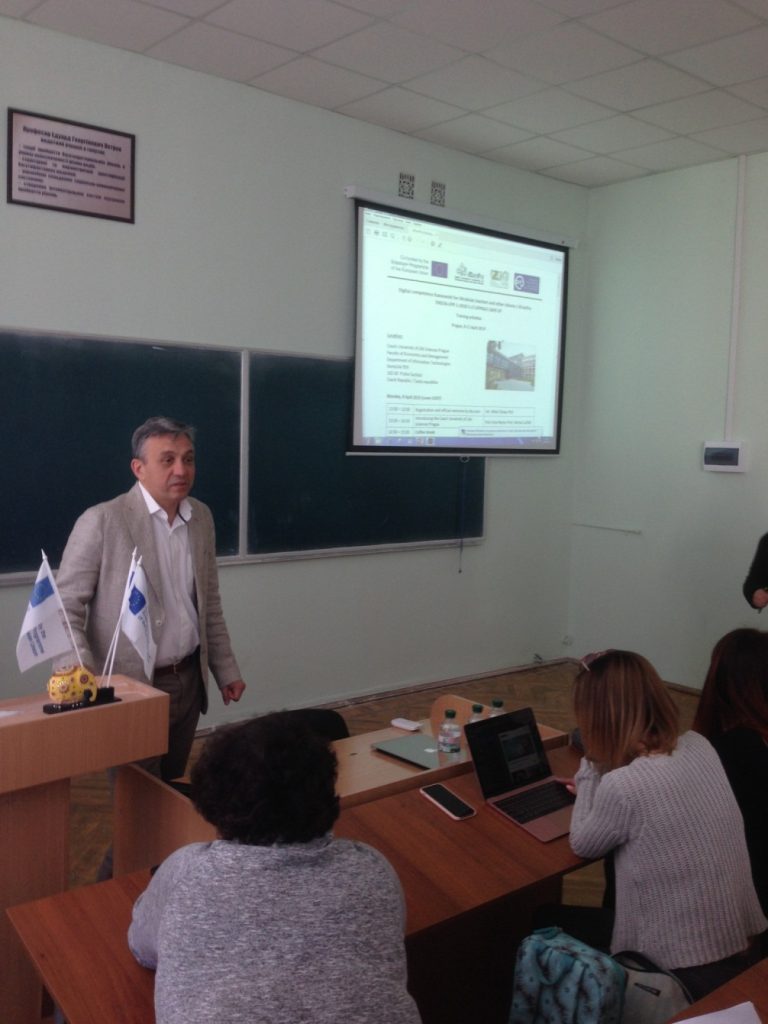On July 10, 19, in cooperation with the Small Academy of Sciences of Ukraine, a visiting information day was held by Professor Onishchenko Andriy Mykhailovych, Professor at the Department of Information Systems and Technologies, at the scientific camp of Kyiv region on the border with the city of Bila Tserkva. Andriy Mikhalovich spoke about the work of the Department of Information Systems and Technologies of Taras Shevchenko National University of Kyiv on international projects with China and Europe. He spoke about the progress of implementation of the Erasmus + program in the direction of KA2: Capacity Building in the Field of Higher Education, the project “dComFra – Digital Competence Framework for Ukrainian teachers and other citizens”.
The NURE delegation took part in the training for the participants of the project Erasmus+
8 July in the Austrian city of Villach started the training for the participants of the project Erasmus +, which was attended by a delegation of the Kharkiv National University of Radio Electronics, headed by the Rector, Professor Valerii Semenets.
Event photos.
Dissemination of European experience among DonNTU teachers
On May 22, 2019, at the Faculty of Computer Science and Technology, information seminars were held to disseminate the knowledge acquired by the DonNTU teachers during numerous trainings. During the seminars, the teachers of the Department of Applied Mathematics and Informatics, Professor Olga Dmitrieva and Associate Professor Natalya Kostyukova, told the participants about the content of the trainings held at the University of Vytautas Magnus (Kaunas, Lithuania) and at the Czech University of Life Science (Prague).
In her speech, Natalya Kostyukova spoke about the strategy of forming digital skills of the population in Lithuania and Europe, educational programs for improving the digital skills of teachers, the work of the Lithuanian National Digital Coalition.
Olga Dmitrieva’s presentation was dedicated to the experience of the Testing Center at the Czech University of Life Science and the strategy of digital skills formation in the Czech Republic. She thoroughly and vividly described the experience of the Czech Republic and the possibilities of its use in DonNTU in the framework of the project implementation. In total, 17 faculty members and staff participated in the seminars.
Partnership Meeting of DonNTU Teachers with European Colleagues Held at Krakow Pedagogical University (Poland)
In May, a working meeting of representatives of the partner universities of the project was held at the Pedagogical University in Krakow. DonNTU’s teachers took part in the work: Vice-rector Yevgen Bashkov and Assistant Professor Natalya Kostyukova.
The meeting reviewed the results of the project implementation activities related to the analysis of existing programs and curricula in European countries, existing trainings for teachers, the digital competences of citizens and education workers in EU countries. The participants discussed the development of competency profiles, didactic approach to training, selection of certification program, development of dComFra project web portal, quality control and dissemination of project information.
SECOND COORDINATION MEETING OF DOMFRA PROJECT PARTNERS
From May 15 to May 17, 2019 at the Pedagogical University of Krakow (Poland), the 2nd coordination meeting of the partners of the project “dComFra – Digital Competence Framework for Ukrainian Teachers and Other Citizens” (No. 598236-EPP-1-2018-1-LT -EPPKA2-CBHE-SP). Measures related to the project implementation and promotion were discussed.
The issues related to the results of the analysis of existing digital competences (DCs) in the curricula and courses at Ukrainian and European universities were considered, the overview of the existing DC related training programs for teachers was presented, the Digital Competence Structure for citizens and teachers was also presented used in EU countries.
NTU “KPI” team presented operating plans, a strategy for sustainability and promotion of the project, as well as a distribution plan. To this end, the following annual events are envisaged: information days, specialized seminars, etc.
Prague educators share experiences in learning digital competencies
From April 9 to April 12, 2019, trainings were held at the Czech University of Life Sciences in accordance with the implementation plan of the project “Digital Competence Framework for Ukrainian Teachers and Other Citizens” (598236-EPP-1-2018-1-LT-EPPKA2-CBHE-SP). The teachers of the Department of Applied Mathematics and Informatics of DonNTU took part in the training: Professor, Head of the Department O.Dmitrieva and Associate Professors N.Kostyukova and N.Maslova.
During the trainings, the staff of Prague University have informed Ukrainian colleagues of strategies for improving digital literacy in the Czech Republic, have demonstrated the work of the university testing center, have told about the practices in teaching computer science and computer technology and about the digital skills strategy in the Czech Republic. The training participants visited the Human Behavior and Virtual Reality Research Labs, learn about innovative teaching methods used at the university, and the large-scale digital support for Moodle & Adobe Connect training.
THE CONCEPT OF INFORMATION SECURITY IN THE IOT SYSTEM
Within the framework of implementation of the international project Erasmus + “dComFra – Digital Competence (Dig Comp) Framework for Ukrainian Teachers and Other Citizens”, a joint publication of the scientific article “The concept of information security in the iot system” was made, authors: A. Serkov, V. Kravets, O. Kasilov, B. Lazurenko, (National Technical University “Kharkiv Polytechnic Institute”, Kharkiv, Ukraine), A. Mickus, (Vytautas Magnus University, Kaunas, Lithuania).
Scientific and Technical Journal “Modern Information Systems” http://ais.khpi.edu.ua
The subject of the study is the processes of ensuring the security of information in wireless control channels and communication of the Internet of Things (IoT). The purpose is to develop the concept of broadband Internet access and to implement key security competencies in the implementation of IoT projects. The model is based on the reference model DigComp 2.0, which was created within the system of digital competence of citizens. Moreover, the main area of competence of this model is safety. The task is to ensure that the IoT system is running smoothly and securely. Methods used: methods of analytical, simulation and temporal position-impulse coding. The following results were obtained. The concept of security in wireless control and communication systems of IoT has been developed. It has been shown that wireless high-bandwidth technology, which enables high volumes and speeds of data transmission, should be used to obtain high noise immunity to control and communication channels and to protect information from interception. The possibility of seamless, one-band operation for both traditional narrowband communication systems and systems that use broadband signals is justified. A technical solution is proposed for the construction of a broadband transceiver antenna system. Conclusions. The use of high bandwidth channels allows for an almost unlimited increase in the number of IoT control channels and communications. Pre-allocation between channels of orthogonal codes implements the process of control and communication without interception of information and interference. Moreover, the use of the temporal position-impulse coding method prevents inter-character distortions of coding short-pulses. This also reduces the level of distortion of information signals caused by its multipath propagation, which guarantees the security of information in the IoT system.
DIG COMP – FOR POLYTECH TEACHERS
NTU “KPI” scientists participated in the international project Erasmus + “dComFra – Digital Competence (Dig Comp) Framework for Ukrainian Teachers and Other Citizens”. Within the framework of the project, teachers of the Department of Information Systems attended trainings that were held for Ukrainian universities for 3 months. They were held at universities in Lithuania, Poland and the Czech Republic. The sessions were dedicated to training teachers and improving their skills in digital literacy, given the rapid development of information technology.
Yes, February 18-22, 2019 Assoc. Systems of Information Chair Anna Zavolodko and graduate student of the Chair Julia Breslawiec participated in a training course held by the University of Vitautas the Great (Kaunas, Lithuania). It addressed many aspects related to digital skills: the development of a training center; development of a strategy to increase the number of CodeWeek events in Ukraine; developing a digital skills initiative plan in Ukraine; learning digital skills of entrants and more.
The second training was held at the Pedagogical University of Krakow and the Krakow Examination Center (Poland) March 18-21, 2019. It was attended by: Senior Lecturer of the Information Systems Department of the KPI, Maxim Tolkachov, Head of the Cisco Instructors Training Center at NTU “KPI”, and Senior Lecturer KhPI, Head of Cisco Academic Support Center NTU “KhPI” Natalia Jenyuk. During the training in Poland, the issues of digital competences of children, teenagers and adults, the certification system of computer knowledge, education in the profession of computer science at the level of secondary schools and others were discussed.
The third, final training was held on April 8-11, 2019 at the Czech Agricultural University of Prague. The senior lecturers of the Information Systems Department Maxim Okhrimenko, Maxim Tolkachev and Natalia Dzeniuk took part in it.
Round Table at KNURE
On April, 23, at the Department of Systems Engineering of the Kharkiv National University of Radio Electronics, a round table was held in which the speakers who passed the training from the Erasmus + project “Digital competence framework for Ukrainian teachers and other citizens” took part. The speakers presented the results of the training, held from 08 to April 11 at the Prague University of Life Sciences CULS (Czech Republic). As a part of the event, the staff of the Department of System Engineering and the staff of the departments of the Faculty of Computer Science presented the following relevant topics for the project:
- experience of the CULS testing center;
- practices in teaching ICT skills;
- digital skills strategy in the Czech Republic;
- teaching ICT skills for foreign students;
- visiting laboratories: human behavioural research & VR;
- innovative ways of learning;
- large-scale digital training support – Moodle & Adobe Connect.
The main outcomes of the Round Table are:
- The speakers presented the results of the training, held from 08 to April 11 at the Prague University of Life Sciences CULS
- presented the following relevant topics for the project: experience of the CULS testing center, practices in teaching ICT skills, etc.
Website: http://nure.ua/en/round-table-on-the-training-of-erasmus-project-took-place-in-knure
The Department of System Engineering of NURE held a round table
April 18 at the Department of System Engineering of the Kharkiv National University of Radio Electronics a round table was held. The event was organized by the participants of the training project Erasmus+ “Digital competence framework for Ukrainian teachers and other citizens”, which was held on March 18-22 in Krakow (Poland).
During the round table, teachers and students learned about the goals and objectives of the project as for the formation and implementation of the framework structure of digital competencies for certain target groups in Ukraine. The main stages of work on the project, the results obtained so far, lectures, meetings and discussions organized during the training at the Krakow pedagogical University, which is one of the participants of the consortium of the project, were presented.
Event photos.













